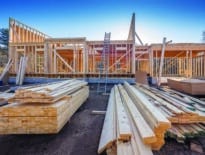Boston will be in the top 10 real estate markets in the country in 2021, the Urban Land Institute has declared.
The industry organization released its annual Emerging Trends in Real Estate report for 2021 in cooperation with consultancy PwC US. The report, which is based on data and insights from roughly 1,600 real estate industry experts, tries to predict how COVID-19 will impact markets across America.
“Times of great change always present significant opportunities,” W. Ed Walter, Global CEO of ULI, said in a statement. “In the near term, our suburbs will benefit from new growth spurred by shifting demographics and changes to living and working patterns resulting from the COVID crisis. Our cities will have the opportunity to respond by reimagining their public realm, building more resiliently, and reinventing assets, such as retail, that were already struggling before the pandemic. As an industry we have the opportunity to strengthen by truly embracing diversity and tackling the challenges faced by our communities.”
Next year, ULI claims, will be dominated by the heightened desirability of lower-density areas for both residential and commercial real estate, with interest concentrated in the Sunbelt markets among cost-conscious companies. This will be paired with growing homebuyer interest in suburban locations with low taxes, affordable housing, auto-oriented transportation and good job prospects, driven by greater rates of family formation among Millennials.
ULI predicts next years top markets will be:
- Raleigh/Durham, North Carolina
- Austin, Texas
- Nashville, Tennessee
- Dallas/Fort Worth, Texas
- Charlotte, North Carolina
- Tampa/St. Petersburg, Florida
- Salt Lake City, Utah
- Washington D.C./North Virginia
- Boston, Massachusetts
- Long Island, New York
Top trends highlighted in the report:
- Anticipate overall real estate prices to fall 5 percent to 10 percent as income is curtailed for several years. Industrial properties, data centers and single-family homes are expected to rise in value, while retail and hospitality will see the largest decline.
- COVID-19 accelerates suburban growth in Sunbelt suburbs thanks to shifts to remote work and projected tax increases in cities smarting from a fall in tourism and other tax revenue.
- Expect office footprints to start shrinking as a cost-saving measure as leases come up for renewal, thanks to what is likely to be a durable increase in work-from-home behavior. But such a trend will be moderated by some firms seeking to expand spaces for new ways of collaboration and interaction, while complying with social distancing measures.
- Health and wellbeing will become ever-more important factors across all sectors, requiring higher standards of cleanliness and safety to attract customers and satisfy tenants.
- Retail operators and landlords will be challenged to respond to changing consumer tastes: less demand for large retailers and department stores and more demand for discount stores, fast fashion and online retail. Available retail space will likely increase and rents may decrease, letting top brands take advantage to upgrade their locations.
- Affordable housing will continue to be an issue, and one the industry will be unable to effectively address without federal government help in the form of expanded low-income housing tax credits or Section 8 vouchers.
The industry will struggle to respond to demands for more socially responsible behavior, the report predicts. Nearly half (48 percent) of respondents in ULI’s survey disagreed that the real estate industry understands how past policies and practices have contributed to systemic racism, while 70 percent agreed that the real estate industry can address and help end racial inequality. Potential areas of activity include minority-focused job training and recruiting programs and efforts to invest and develop minority and low-income neighborhoods with an emphasis on housing and schools.
“Now, more than ever, the real estate industry has the chance to take the lead in using planning and development skills and investment capital to reshape our work and lifestyle environments. These tools can be used to address societal issues of safety, green space and racial equity,” Byron Carlock, PwC partner and U.S. real estate practice leader, said in a statement. “The gauntlet of responsibility is ours to embrace, and industry leaders see the opportunities and are responding with investment and leadership.”




 |
| 


